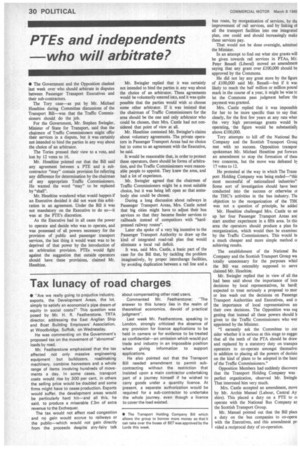Tax lunacy of road charges
Page 32

If you've noticed an error in this article please click here to report it so we can fix it.
• -Are we really going to prejudice industry, exports, the Development Areas, the lot, simply to satisfy an economist's pipe dream of equity in social costs?" This question was posed by Mr. H. R. Featherstone, TRTA director, addressing the East Anglian Ship and Boat Building Employers' Association, at Woodbridge, Suffolk, on Wednesday.
He was commenting on the Government's proposed tax on the movement of "abnormal" loads by road.
Mr. Featherstone emphasized that the tax affected not only massive engineering equipment but bu Ildoze rs, road making machinery, combine harvesters and a whole range of items involving hundreds of movements a day. In some cases, transport costs would rise by 300 per cent, in others the selling price would be doubled and some firms might have to cease production. Exports would suffer, the development areas would be particularly hard hit—and all this, he said, to produce a miserable £3m of extra revenue to the Exchequer.
The tax would not affect road congestion and no gain would accrue to railways or the public—which would not gain directly from the proceeds despite airy-fairy talk about compensating other road users.
Commented Mr. Featherstone: -The answer to this lunacy lies in the realm of theoretical economics, devoid of practical judgment".
Last week Mr. Featherstone, speaking in London, strongly criticized the absence of any provision for licence applications to be held in camera or for evidence to be treated as confidential—an omission which would put trade and industry in an impossible position when giving information to support applications.
He also pointed out that the Transport Bill needed amendment to permit subcontracting without the restriction that insisted upon a main contractor undertaking part of a journey himself if he wished to carry goods under a quantity licence. At present, a separate authorization would be required for a sub-contractor to undertake the whole journey, even though a licence to cover the load existed.




































































































































